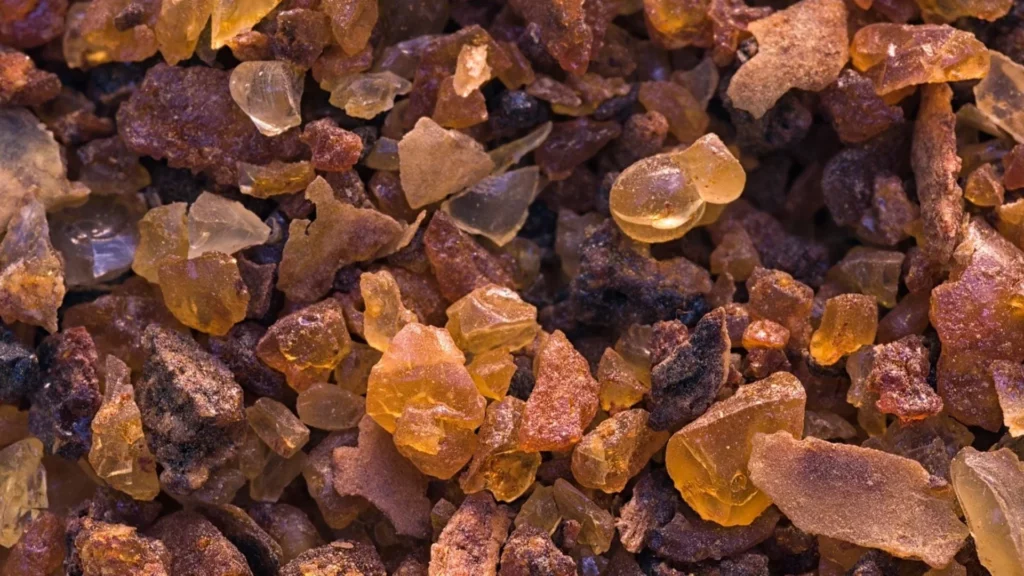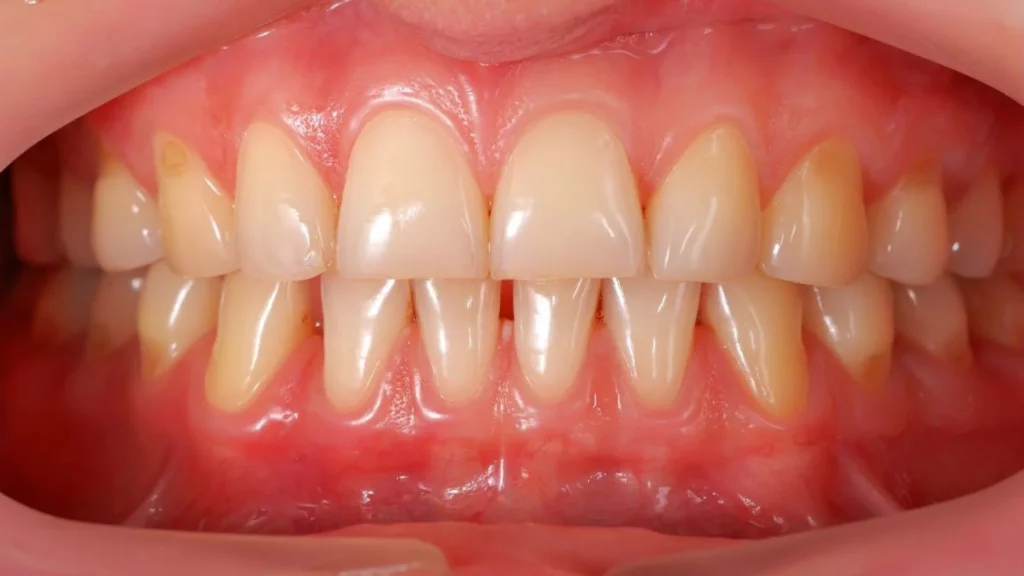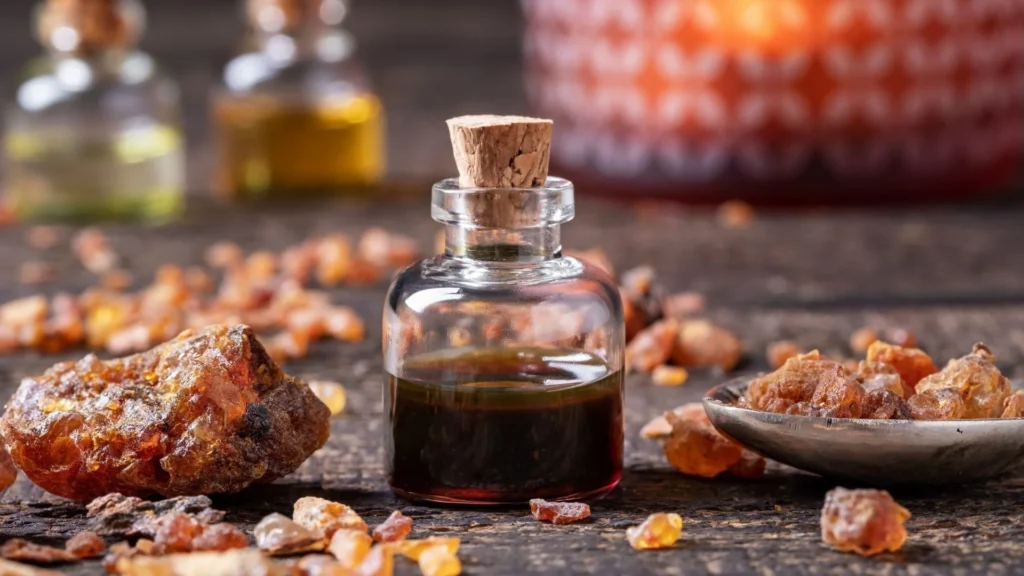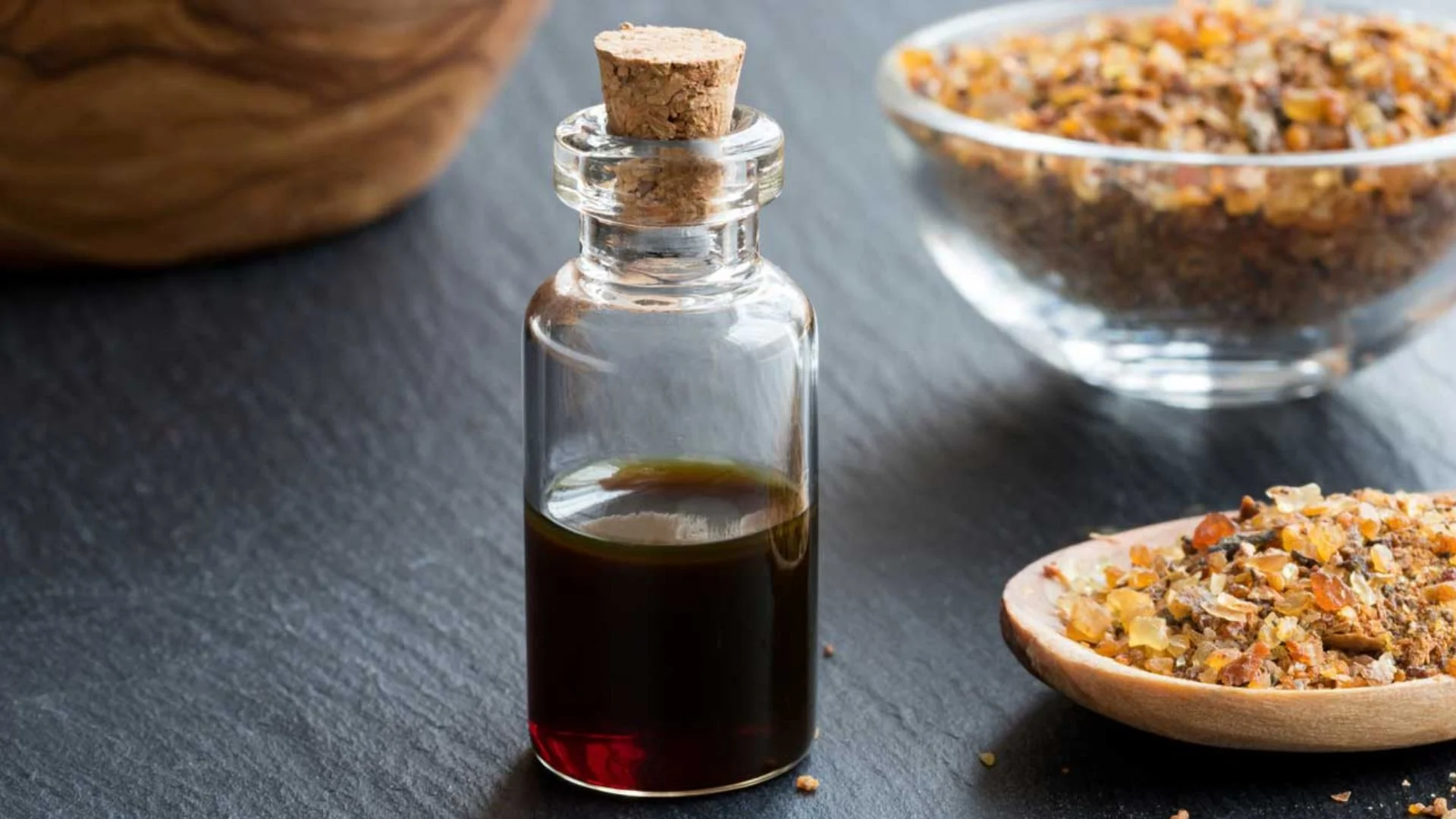Last Updated on: 13th December 2025, 06:49 am
Myrrh in oral health offers antimicrobial, anti-inflammatory, and astringent benefits that support gum health, freshen breath, and promote healing after dental procedures. It’s commonly found in natural toothpaste, mouthwashes, and essential oil blends.
Herbs have played a crucial role in healthcare for thousands of years. Recently, a tren has arisenwhere natural alternatives are taking preference over their synthetic substitutes. One of them is myrrh, a resin known for its outstanding health benefits. Although it is often linked to religious rituals, myrrh’s importance extends well beyond this limited association. With its potent antimicrobial and anti-inflammatory properties, it accounts for a viable solution to address a wide array of oral health problems.
This article explores the origins and properties of myrrh, with a focus on the use of myrrh in oral health, its overall health benefits, and its growing popularity as an ingredient in a wide variety of oral care products.
What is myrrh and where is it found?

In Saudi Arabia, myrrh is a popular herb that is frequently used as a home remedy for a variety of healthcare problems. This oleo-gum resin originates from the tree Commiphora molmol while the shrub-like Balsamodendron myrrh variety is commonly found in the Middle East and North Eastern Africa’s arid regions. The word “myrrh” comes from the Arabic word murr, which means “bitter.”
This scruffy tree, for obvious reasons, does not neatly fit into a toothpaste tube. The reddish-brown resin extracted from the sticky sap found on the tree branches stems, and bark is used to make myrrh, which is eventually utilized in cosmetic and medicinal applications. Myrrh is often sold in the form of a natural resin, an essential oil, or as a tincture.
How is myrrh in oral health used to support your smile?
Recognizing the exceptional benefits of myrrh, oral care product manufacturers have started incorporating this remarkable resin into toothpaste, mouthwashes, and several other products. The following justifies the growing popularity of myrrh in oral health as an integral component in dental care:
Antimicrobial action:
Myrrh is a great addition to oral hygiene products due to its inherent antimicrobial qualities. It lessens the chance of cavities, gum disease, and other oral illnesses by assisting in the fight against harmful bacteria, fungi and viruses.
Gum health:

By lowering swelling and redness, myrrh’s anti-inflammatory qualities support healthier gums. Gingivitis, periodontitis, and gum disease can all be prevented and made better with this fantastic plant. This is probably one of the best benefits of myrrh in oral health.
Fresh breath:
Myrrh is a great element to fight bad breath because of its pleasant aroma and capacity to neutralize strong odors. It can also be used for aromatherapy purposes. A lot of people use myrrh in oral health just for its great aroma in the mouth.
Improved Oral Hygiene:
The addition of myrrh to mouthwash and toothpaste increases the overall effectiveness of these products and provides a holistic and natural approach to oral care.
Astringent action:
Myrrh aids in tightening the gums and strengthening oral tissues.
Faster wound healing post-extraction:
Myrrh in oral health promotes faster healing of oral wounds like extraction sockets and ulcers.
Antioxidant action:

It protects oral tissues from oxidative damage. A test-tube study found that myrrh oil was more effective than vitamin E, a powerful antioxidant, at fighting free radicals.
What are the overall health benefits of myrrh?
In addition to its remarkable benefits of myrrh in oral health, this incredible plant provides a range of other health benefits, including:
- Better healing: treats minor cuts, burns, and abrasions with its antiseptic and anti-inflammatory properties.
- Improves digestive health: eases digestive discomfort, reduces inflammation, and supports bowel regularity.
- Promotes good respiratory health: relieves congestion and coughing, and supports respiratory function.
- Better circulation: enhances blood circulation and ensures proper oxygenation or living tissues.
How can you use myrrh in oral health and what forms are available?
This incredible plant is typically available as an ingredient in toothpaste, but it can also be used in the form of a mouthwash and an essential oil. Continue reading to learn more!
1. Myrrh in toothpaste
As mentioned, whether you are seeking to improve gum health, freshen your breath, or enhance overall oral hygiene, a myrrh-based toothpaste can be a worthy addition to your daily oral care routine.
2. Myrrh in mouthwash
Research suggests that myrrh mouthwash is an effective antiplaque and antigingivitis agent. It can be used as an adjunct to mechanical plaque control in the treatment of periodontitis patients with fewer reported side effects and a high compliance rate when compared to traditional chlorhexidine and tetracycline.
Below is a simple guide on how to make this mouthwash in the comfort of your home and how to use it effectively:
Ingredients
- 2 cups 100-proof spirits, like vodka
- 1 tablespoon powdered myrrh
- 1 tablespoon whole cloves
- 1/4 cup chopped spearmint leaves fresh
Instructions for use:
- Note: Use granules and replace 100 proof spirits with 190 proof if powdered myrrh is not available.
- Place all of the ingredients in a jar and cover it tightly. Shake it every day for 4-6 weeks while infused.
- Strain the liquid after infusion and move it to dropper bottles for storage.
- To use: Fill a shot glass with 5–10 drops of water. Spit out after swishing about the mouth for around 30 seconds.
3. Myrrh as an essential oil

Myrrh oil has calming and soothing properties and it may be used for oil pulling, which helps whiten teeth. It is a unique and potent essential oil that soothes and calms your gums while you swish; it also promotes speedy recovery for a healthy mouth!
Is myrrh safe to use and what dosage is recommended?
Myrrh is generally regarded as safe, with the exception of allergic reactions. Because of its hypoglycemic effects, it should not be taken internally by pregnant women or those undergoing diabetic therapy.
Also, people taking anticoagulant drugs shouldn’t use it because of its blood-moving and stimulating properties. When taken as a medication, myrrh may be safe in dosages up to 400 mg three times per day for a maximum of 12 months. Usually, people tolerate it well. However, using a high dosage of myrrh could be dangerous. Doses beyond 2-4 grams may alter heart rate and create renal issues.
In summary, myrrh is an age-old natural remedy that has proven its effectiveness and potency over thousands of years. Myrrh in oral health offers a multiverse of benefits, contributing to the care of teeth, and gums, and even helping with bad breath.
Despite its many advantages, it comes with its set of side effects that must be taken into due consideration. When used under the guidance of a healthcare professional, this amazing plant can be a useful alternative to synthetic substitutes and yield many benefits!
Frequently Asked Questions
Can you brush your teeth with myrrh?
Yes, you can brush your teeth with myrrh, but it should be used with caution. Myrrh essential oil can be very potent, so it’s important to dilute it properly before use. You can add a drop of myrrh essential oil to a small amount of toothpaste or mix it with a carrier oil (such as coconut oil) to create a natural toothpaste. Brushing with myrrh can help reduce inflammation, fight bacteria, and promote overall oral health.
Is myrrh good for teeth and gums?
Yes, myrrh is good for your teeth and gums. Myrrh has antibacterial and anti-inflammatory properties that make it effective in treating gum disease, reducing inflammation, and healing mouth sores. It helps in maintaining oral hygiene by combating bacteria that cause plaque and bad breath. Additionally, myrrh can soothe irritated gums and promote the healing of minor wounds in the mouth.
Has myrrh been used in toothpaste?
Yes, myrrh has been used in toothpaste. Due to its beneficial properties for oral health, myrrh is a common ingredient in many natural and herbal toothpastes. These toothpastes leverage myrrh’s antibacterial, anti-inflammatory, and healing properties to help maintain healthy teeth and gums, reduce plaque buildup, and prevent gum disease. Myrrh toothpaste is particularly popular among those looking for natural alternatives to conventional dental products.
Can I gargle with myrrh?
Yes, you can gargle with myrrh. To do this, add a few drops of myrrh essential oil to a glass of warm water and mix well. Gargling with myrrh can help reduce inflammation, fight bacteria, and soothe sore throats. It is an effective way to maintain oral hygiene and promote gum health. However, it’s important to ensure that the myrrh oil is properly diluted to avoid irritation. Always spit out the solution after gargling and avoid swallowing it.
Can you use myrrh for a toothache?
Yes, you can use myrrh for a toothache. Myrrh essential oil has natural analgesic and anti-inflammatory properties that helps relieve the pain associated with a toothache. To use myrrh for a toothache, dilute a few drops of myrrh essential oil in a carrier oil (such as coconut or olive oil) and apply it directly to the affected area using a cotton ball. This can help reduce inflammation and provide temporary pain relief.
Additionally, myrrh’s antibacterial properties help fight off any underlying infections that may be contributing to the toothache. It is important to note, however, that while myrrh can provide temporary relief, it is not a substitute for professional dental care. If you have a persistent toothache, it is essential to consult a dentist to address the underlying cause.
What are the health benefits of myrrh essential oil?
Myrrh essential oil has powerful antibacterial and anti-inflammatory properties, making it effective in treating gum disease, mouth ulcers, and bad breath. It helps reduce gum inflammation, fights oral bacteria, and promotes overall dental health. Its antiseptic qualities also aid in healing minor mouth wounds.
Beyond oral health, myrrh is used for its healing and soothing properties. It can treat minor skin wounds, reduce swelling, and alleviate pain. Myrrh’s antioxidant properties protect cells from free radical damage, and its calming scent is popular in aromatherapy for reducing stress and anxiety.
Voice and Search (Q&A)
How does myrrh help with gum inflammation?
Myrrh reduces gum inflammation thanks to its anti-inflammatory properties, helping soothe swollen or bleeding gums and supporting recovery from gingivitis or periodontal issues.
Is it safe to use myrrh mouthwash daily?
Yes, myrrh mouthwash is generally safe for daily use if properly diluted. It helps prevent plaque and supports oral hygiene, but should be avoided by people with certain medical conditions or allergies.
Can myrrh speed up healing after a tooth extraction?
Yes, myrrh promotes faster healing of wounds like tooth extraction sites due to its antiseptic and tissue-repair properties. It can reduce inflammation and the risk of infection.
Share
References
1. AlMogbel, A. (2023). Clear Aligner Therapy: Up to date review article. Journal Of Orthodontic Science, 12(1), 37. https://doi.org/10.4103/jos.jos_30_23
2. Caruso, S., De Felice, M. E., Valenti, C., Pagano, S., Caruso, S., Gatto, R., & Lombardo, G. (2024). An evaluation of the Invisalign® Aligner Technique and consideration of the force system: a systematic review. Systematic Reviews, 13(1). https://doi.org/10.1186/s13643-023-02437-5
3. Dahhas, F. Y., Al-Saif, E. M., Alqahtani, A. M., Farraj, N. F. A., Alshaikh, M. A., Almadhi, B. S., Albuolayan, N., Alhayaza, H. H., Asiri, N. A., & Alshaya, K. H. (2023). The Potency of Invisalign® in Class II Malocclusion in Adults: A Narrative Review. Curēus. https://doi.org/10.7759/cureus.49664
4. Dahhas, F. Y., Al-Saif, E. M., Alqahtani, A. M., Farraj, N. F. A., Alshaikh, M. A., Almadhi, B. S., Albuolayan, N., Alhayaza, H. H., Asiri, N. A., & Alshaya, K. H. (2023). The Potency of Invisalign® in Class II Malocclusion in Adults: A Narrative Review. Curēus. https://doi.org/10.7759/cureus.49664
5. Dorwart, L. (Mar 12, 2022). Invisalign vs. Braces: Which Is the Better Option? Verywell Health. https://www.verywellhealth.com/invisalign-vs-braces-5218916
6. González, C. (Apr 24, 2024). ¿Qué es la maloclusión Clase II de Angle? Dentaly.org. https://www.dentaly.org/es/ortodoncia/maloclusion/clase-2/
- Nayibe Cubillos M. [Author]
Pharmaceutical Chemestry |Pharmaceutical Process Management | Pharmaceutical Care | Pharmaceutical Services Audit | Pharmaceutical Services Process Consulting | Content Project Manager | SEO Knowledge | Content Writer | Leadership | Scrum Master
View all posts
A healthcare writer with a solid background in pharmaceutical chemistry and a thorough understanding of Colombian regulatory processes and comprehensive sector management, she has significant experience coordinating and leading multidisciplina...Recent Posts















